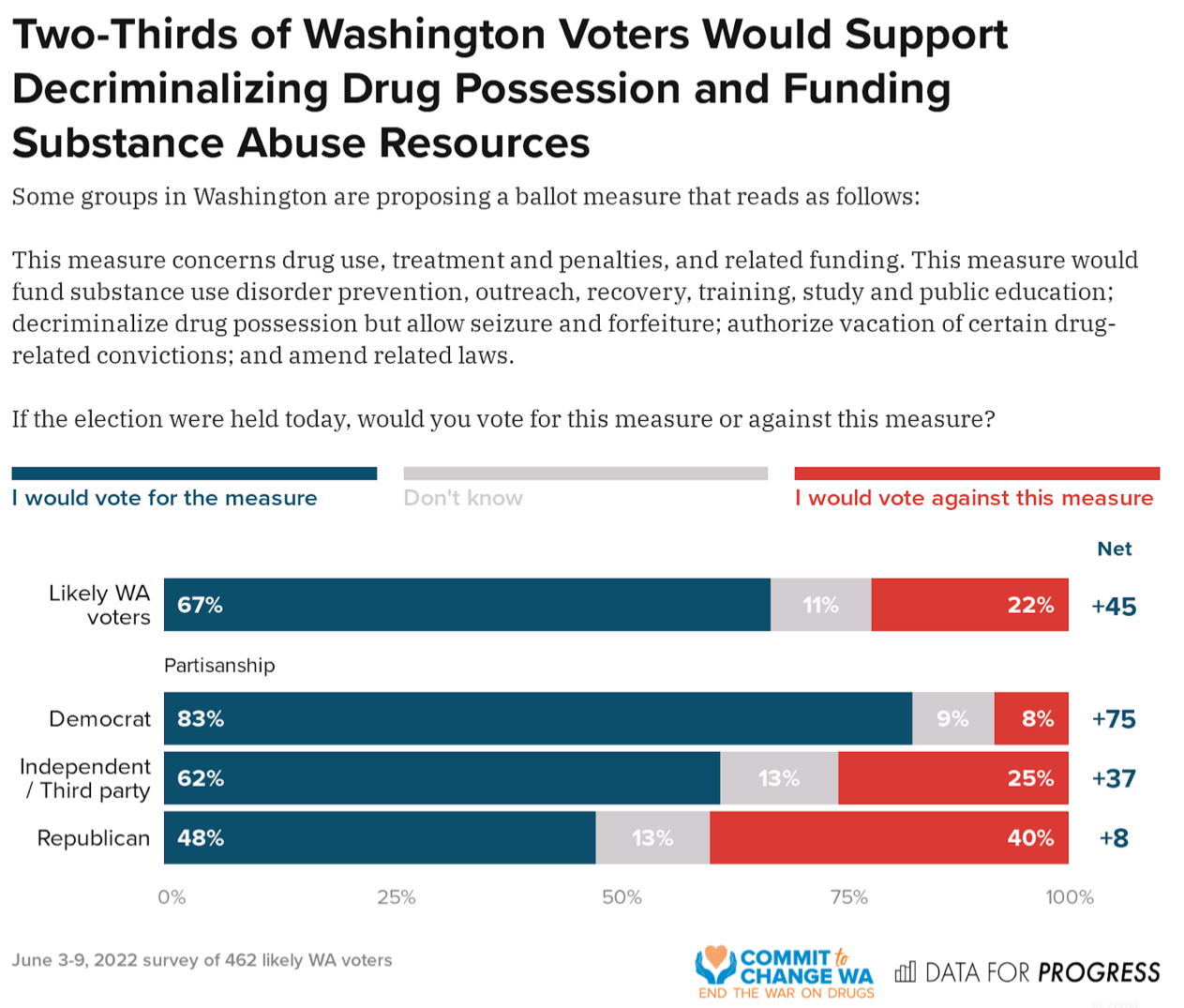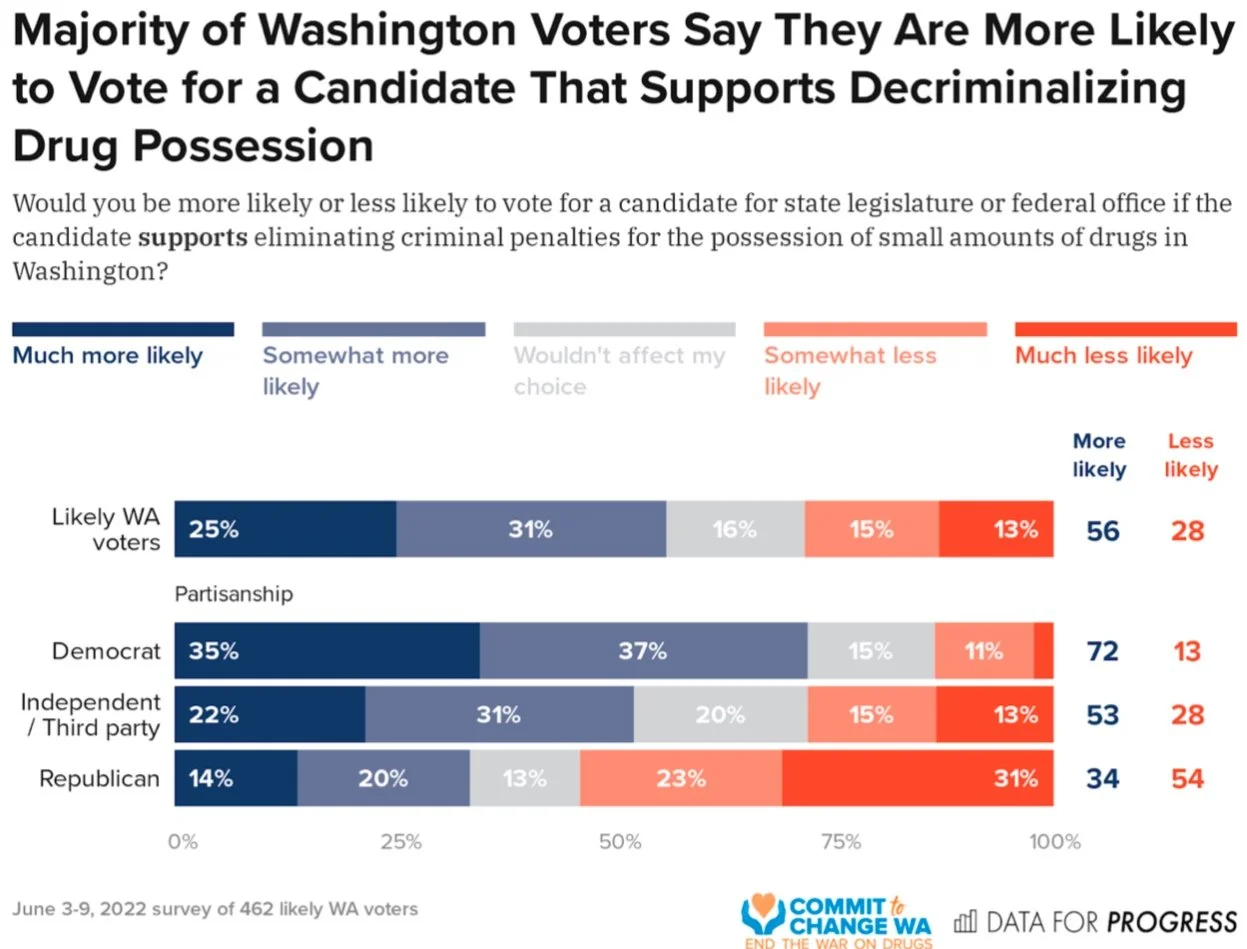Washington Voters Want to Decriminalize Drug Possession and Fund Substance Abuse Resources
By Anika Dandekar
In the face of rising overdoses and public safety concerns in Washington state, groups proposed Initiative 1922, a ballot initiative that would have funded prevention, treatment, and recovery services for substance use disorders and decriminalized drug possession for personal use. Data for Progress conducted a survey of 462 likely voters in Washington from June 3 to 9, 2022, and finds support among a significant majority of Washington voters of all parties for such a measure, as well as each of its provisions.
Washington Voters Want Drug Use Treated as a Public Health Issue
We first asked whether drug use should be treated as a public health or criminal justice issue. Over three-quarters (85 percent) of likely Washington voters respond that it should be treated as a public health issue. This finding is true among large majorities of Democratic (96 percent), Independent (83 percent), and Republican (70 percent) voters in Washington as well.
Washington Voters Would Support I-1922 and All Its Provisions
When presented with the proposed ballot language for Initiative 1922, 67 percent of voters in the state say they would vote for its passage, with a +45-point margin over those who say they would vote against it. A plurality of voters across party lines say they would vote for the measure, including Democrats, Independents, and Republicans by respective net margins of +75, +37, and +8 points.
We also tested support for each of I-1922’s proposed provisions. All of these provisions are very popular among Washington voters. Using existing cannabis taxes to fund substance use treatment and recovery services is backed by a +73-point margin (I-1922 would have redirected cannabis taxes that are not already earmarked for other purposes and currently flow to the state general fund). Requiring law enforcement to direct all Washingtonians found in possession of drugs to outreach and engagement services is supported by a +71-point margin. Using existing cannabis taxes to fund training for law enforcement on substance use is supported by a +69-point margin. Using existing cannabis taxes to fund public education on substance use is backed by a +64-point margin. Using existing cannabis taxes to fund substance use research and advisory committees is supported by a +62-point margin. Eliminating criminal penalties for possession of personal use amounts of drugs, but allowing law enforcement to take the drugs away is supported by a +40-point margin. Making it easier to remove certain drug-related convictions from Washingtonians’ records is backed by a +37-point margin.
Washington Voters Are More Likely to Vote For a Candidate Who Supports Decriminalizing Drug Possession
A majority of likely voters in Washington (56 percent) say they would be more likely to vote for a candidate for state legislature or federal office if the candidate supports eliminating criminal penalties for the possession of small amounts of drugs in Washington. A majority of Democrats (72 percent) and a majority of Independents (53 percent) would be more likely to vote for a candidate who supports decriminalizing drug possession. Thirty-four percent of Republicans would be more likely to vote for a candidate who supports decriminalizing drug possession, while 54 percent say they would be less likely to vote for such a candidate.
Conclusion
The coronavirus pandemic and related economic strains have exacerbated Washingtonians’ mental health struggles and highlighted the need to act urgently on drug reform. Decriminalizing drug possession and funding resources for those struggling with substance use have proven effective in reducing infections, incarceration rates, overdose deaths, and drug-related crimes in other countries. Though the proposed Initiative 1922 will no longer be on Washington ballots this November, legislators in the state must note that Washington voters are ready to end the War on Drugs and want to start treating substance use issues with compassion and data-backed policies.
Anika Dandekar (@AnikaDandekar) is a polling analyst at Data for Progress.




